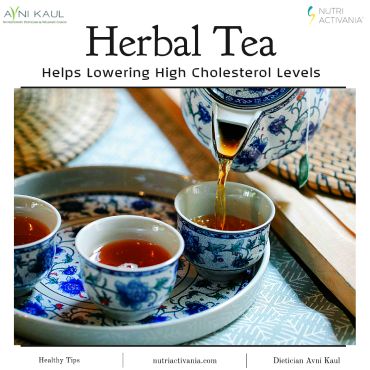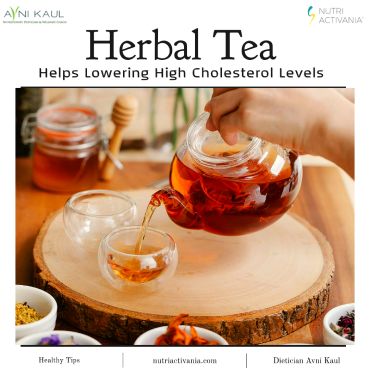Cholesterol is a lipid molecule essential for various bodily functions, including hormone production and cell membrane formation. However, elevated levels of cholesterol, particularly low-density lipoprotein (LDL) cholesterol, can lead to serious health issues, such as heart disease and stroke. While medications are commonly prescribed to manage high cholesterol, lifestyle changes, including dietary adjustments, can also play a significant role. One such dietary adjustment is the incorporation of herbal teas, which have been traditionally used for their health benefits, including potential cholesterol-lowering properties as explained by leading Dietician for cholesterol and cardiovascular health, Avni Kaul, in this blog.
What is Cholesterol?
Before delving into how herbal teas can help manage cholesterol levels, it is important to understand the two main types of cholesterol:
- Low-Density Lipoprotein (LDL): Often referred to as “bad” cholesterol, high levels of LDL can lead to plaque buildup in arteries, increasing the risk of cardiovascular diseases.
- High-Density Lipoprotein (HDL): Known as “good” cholesterol, HDL helps transport cholesterol away from the arteries to the liver for excretion.
What is the Link between Herbal Teas and Cholesterol?
1. Green Tea – Green tea is perhaps the most well-known for its health benefits, including its potential to lower cholesterol. Rich in catechins, particularly epigallocatechin gallate (EGCG), green tea has been shown to reduce LDL cholesterol levels while raising HDL cholesterol levels. Catechins work by inhibiting the absorption of cholesterol in the intestines and promoting its excretion.
2. Black Tea – Black tea, which undergoes more oxidation than green tea, also contains beneficial compounds that can help manage cholesterol. Studies suggest that black tea consumption can reduce LDL cholesterol levels by interfering with cholesterol absorption in the intestines. While its catechin content is lower than green tea, it still offers significant benefits.
3. Oolong Tea – Oolong tea, which falls between green and black tea in terms of oxidation, also exhibits cholesterol-lowering properties. It contains polyphenolic compounds that can help reduce LDL cholesterol levels. Regular consumption of oolong tea has been associated with improved lipid profiles in various studies.
4. Hibiscus Tea – Hibiscus tea, made from the dried petals of the hibiscus flower, is another herbal tea noted for its cholesterol-lowering effects. Rich in antioxidants, particularly anthocyanins, hibiscus tea has been shown to reduce both total cholesterol and LDL cholesterol levels. Additionally, it may help improve liver function, which plays a crucial role in cholesterol metabolism.
5. Rooibos Tea – Rooibos tea, native to South Africa, is caffeine-free and rich in antioxidants like aspalathin and nothofagin. These antioxidants can help reduce oxidative stress and lower LDL cholesterol levels. Some studies suggest that rooibos tea may also improve overall lipid profiles and support heart health.
6. Garlic Tea – Garlic is well-known for its cardiovascular benefits, and garlic tea is an effective way to harness these properties. Allicin, a compound found in garlic, can help lower LDL cholesterol and total cholesterol levels. Regular consumption of garlic tea may contribute to better cholesterol management and reduced risk of heart disease.
What about the Mechanisms of Action?
The cholesterol-lowering effects of herbal teas can be attributed to several mechanisms:
- Antioxidant Activity: Many herbal teas are rich in antioxidants, which can reduce oxidative stress and prevent the oxidation of LDL cholesterol, a key factor in the development of atherosclerosis.
- Inhibition of Cholesterol Absorption: Certain compounds in herbal teas can interfere with the absorption of cholesterol in the intestines, leading to lower blood cholesterol levels.
- Enhanced Cholesterol Excretion: Herbal teas can promote the excretion of cholesterol through bile acids, reducing overall cholesterol levels in the body.
- Anti-inflammatory Effects: Chronic inflammation is a contributing factor to high cholesterol and heart disease. The anti-inflammatory properties of herbal teas can help reduce inflammation and improve cardiovascular health.
Incorporating herbal teas into your daily routine can be a natural and effective way to manage high cholesterol levels. While they should not replace prescribed medications or other lifestyle changes recommended by healthcare providers, herbal teas can serve as a complementary approach to improving heart health. Green tea, black tea, oolong tea, hibiscus tea, rooibos tea, and garlic tea are among the most promising options. As with any dietary change, it is important to consult a healthcare professional, especially if you have underlying health conditions or are taking medications.
While the potential benefits of herbal teas are promising, further research is needed to fully understand their impact on cholesterol and overall heart health. Nonetheless, the antioxidants and other beneficial compounds in these teas make them a valuable addition to a heart-healthy diet.



